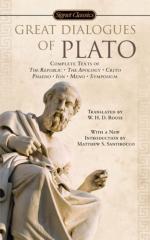
|
| Name: _________________________ | Period: ___________________ |
This quiz consists of 5 multiple choice and 5 short answer questions through Republic: Book I.
Multiple Choice Questions
1. One large theme that permeates throughout Meno is:
(a) A proposition can only be deemed valid if it is testable in the empirical world.
(b) There can never be universal ethics.
(c) Learning is really a recollection of old knowledge.
(d) Non- virtuous people can still perform virtuous actions
2. When pressed by Socrates to explain his skill, Ion asserts which of the following?
(a) When he recites poetry he feels like the poet himself.
(b) When he recites passage about military exploits he cannot tell if he does so with the candor of a general.
(c) Socrates should not be asking him questions.
(d) He is unqualified to comment on the artistic value of the his recitations.
3. When Ion admits to Socrates that he can only recite one poet's work well, Socrates is puzzled by which of the following?
(a) Ion's hesitation to answer questions about his family.
(b) How an artistic skill can be limited in its expertise.
(c) How Ion considers himself a philosopher.
(d) Ion's desire to speak with Socrates about his work.
4. Socrates claims that he learned about love from which of the following?
(a) Plato.
(b) Meno.
(c) Alcibides.
(d) Diotima.
5. To illustrate one facet of his argument, Socrates employs the help of which character?
(a) A nearby guard who speaks about virtuous people he knows.
(b) A nearby slave boy to whom he teaches simple geometry.
(c) Plato to clarify Socrates' words for a perplexed Meno.
(d) Meno's wife.
Short Answer Questions
1. Who said the following: "may not the art of which neither teachers nor disciples exist be assumed to be incapable of being taught?"
2. At whose house does the Symposium take place?
3. In the dialogue, Meno blames the confusion in his speech on which of the following?
4. From which poet does Polemarchus derive his definition of justice?
5. Describe Meno's appearance and attitude when he meets Socrates.
|
This section contains 377 words (approx. 2 pages at 300 words per page) |

|




